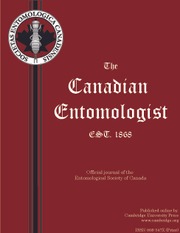Article contents
NOTES ON PHYTOMYZA WITH A DESCRIPTION OF A NEW SPECIES. (DIPTERA)
Published online by Cambridge University Press: 31 May 2012
Extract
Attention is called to some characters used by the writer. The dorso-central bristles are numbered from the anterior edge of the mesonotum designating the bristle in front of the transverse suture as the first dorso-central. Hering (1927) numbers them in the reverse direction calling the bristle in front of the transverse suture the fourth dorso-central. Previous papers on the chaetotaxy of Diptera have not numbered the dorso-central bristles. The number and arrangement of the setae along the lower and hind margin of the cheeks also lend good characters. The writer speaks of the cheeks collectively as the portion between the eyes and the mouth including the gena or wangen arrd the bucca. The term occiput has been used to designate the whole of the back of the head. The color of the occiput has been found valuable especially when the yellow of the cheeks continues back of the eye. In some cases the yellow of the cheeks is interrupted near the vertex by the black of the occiput.
- Type
- Articles
- Information
- Copyright
- Copyright © Entomological Society of Canada 1928
References
1. Hering, Martin. Die Tierwelt Deutschlands, Zweiflugler oder Diptera, 1927.
2. Frost, S. W. Cornell Univ. Agric. Exp. Sta. Mem. 78, 1924.
3. de Meijere, J. C. H. Tidschr. Entom. 68–69, 1925–26.
- 1
- Cited by


